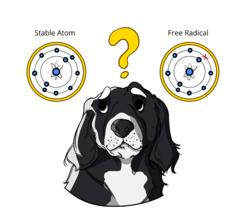Antioxidants are nature’s way of keeping the byproducts of your metabolism in check. Too few can cause major health issues, both chronic and acute, for humans and pets alike.
They are found by the handful in many plant foods, but you have likely also seen them on store shelves packed into pills or powders.
You may even have some in your kitchen cabinet right now.
You may have considered the idea that your pet needs to be eating better. Or maybe you are toying with the idea of supplementing his already healthy diet with something more, perhaps to boost his immune system or encourage birthing healthy puppies.
There are many products on the market that will convince you that they do just that: that they ensure optimal health for your dog.
But what does he really need? What will actually make the biggest difference?
One answer is antioxidants.
What Do Antioxidants Do?

Your body is constantly working to maintain balance in all its systems, all the way down to its subatomic particles.
Essential metabolic processes constantly being performed in your cells often break oxygen molecules for use, which may leave an unpaired electron floating around your body. These electrons are called free radicals and too many can throw your body out of balance.
Your body needs free electrons to fight infection, so small numbers are helpful. Too many free radicals, however, can cause oxidative stress and can be linked to diabetes, heart disease, cancer, and premature aging. Long-term, oxidative stress can damage DNA and kill cells.
A multitude of environmental and lifestyle factors contribute to excessive free radical formation:
- Air pollution
- Cigarette smoke
- Drug and alcohol usage
- Ingesting toxins and chemicals
- Intense and prolonged stress
- Long term or untreated bacterial, viral, or fungal infections
- Sustained high blood sugar levels
- Too much or too little oxygen in the body
- Too much fat or too much sugar in the body, or not enough fruits and vegetables
- Pesticide and insecticide residue
- X-rays
- Ozone
- Industrial chemicals
Free radicals can damage and deteriorate cells. Antioxidants stop the process before it has a chance to harm you or your pet.
Antioxidants fight free radicals in the body by inhibiting oxidation, which is the chemical reaction that releases the electron, turning it into a free radical.
There are two main types of antioxidants: water-soluble, which perform their functions on the inside and the outside of cells, and fat-soluble, which work primarily in the middle in the cell membrane. Both are essential to optimal health.
Your body creates its own antioxidants, such as glutathione, but the best way to fight free radicals is to consume foods high in antioxidants. Be advised, however: excessive intake of antioxidants, particularly of one single isolated type, can be just as harmful as a deficiency.
In humans, it is suggested that we eat a varied, well-balanced diet full of organic whole grains and produce. Dark chocolate, berries, coffee, green tea, and extra virgin olive oil are all popular food sources of antioxidants, as are many herbs and spices like turmeric. Red wine is often touted as an amazing source of antioxidants, and it is often made into tablets and sold as concentrated polyphenols for heart health.
But what about your dog? None of those choices are really safe for him. No responsible pet owner would pass their pooch a bowl of dark chocolate and coffee for the sake of eliminating free radicals.
Side note: your dog can NOT have grapes in any form. Raisins are out as well. Red wine may be a lovely drink for a human dinner party but keep it far from Fido.
Do your pets need antioxidants, too? You want them to be healthy and live as long and as well as they can, so it makes sense to ensure their bodies are in top running condition. Antioxidants can help.
There are several ways of ensuring your dog has adequate levels of antioxidants in his body. Supplements combining vitamins E and C, selenium, and beta carotene are popular options widely available in pet stores and online. They are also often added to commercial pet foods.
Any animal can benefit from antioxidants, but they can also help dramatically reduce the effects of chronic illness.





